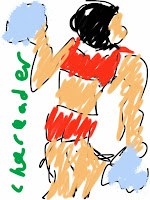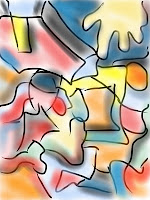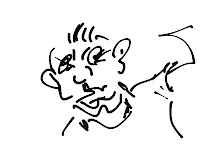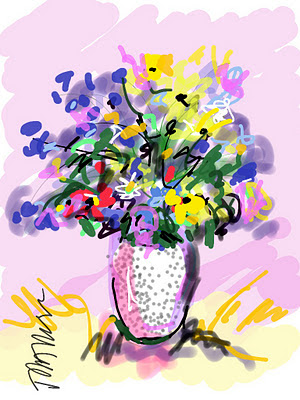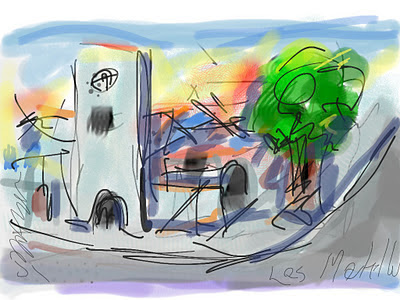How important is eyesight to painting? Seems like kind of a ridiculous question, I agree. But what do we actually mean by ‘seeing’ when it comes to painting, when it comes to appreciating things visual? When I was young my dad used to say that I would appreciate ‘views’ more when I was older. And by this I guess he meant that I would be less distracted by other things - I wouldn’t be more interested in whatever game I was playing, and would be able to give a ‘view’ the time and appreciation it deserved.
 When I was at art school I remember one or two teachers telling us that we needed to learn how to ‘see’. What they meant was the ability to visually interpret what is before us - see all colours, shapes, light, shade, perspective, so that we would be able to turn all this into a 2 dimensional image on paper. I think broadly this is true: you can’t draw, you can’t paint, unless you learn how to see, learn how to look at things. Then to make a painting, a satisfying picture, you have to see a composition. To quote what apparently is a chinese proverb: “First I saw the mountains in the painting, then I saw the painting in the mountains”. And to quote John Ruskin: “You do not see with the lens of the eye ... but you see with the soul of the eye”. So there is more to “seeing” than eyesight.
When I was at art school I remember one or two teachers telling us that we needed to learn how to ‘see’. What they meant was the ability to visually interpret what is before us - see all colours, shapes, light, shade, perspective, so that we would be able to turn all this into a 2 dimensional image on paper. I think broadly this is true: you can’t draw, you can’t paint, unless you learn how to see, learn how to look at things. Then to make a painting, a satisfying picture, you have to see a composition. To quote what apparently is a chinese proverb: “First I saw the mountains in the painting, then I saw the painting in the mountains”. And to quote John Ruskin: “You do not see with the lens of the eye ... but you see with the soul of the eye”. So there is more to “seeing” than eyesight.
In fact, what is very interesting is that historically many of the world’s greatest paintings were painted by artists reportedly with faulty eyesight. Included in this list are Degas, Monet, Kandinsky, Rembrandt, El Greco, Goya, Renoir and probably others. Margaret Livingstone, a professor of neurobiology at Harvard, has undertaken a study into the eyesight of artists, and has discovered that established artists are more likely to have astigmatisms than the general population. See http://www.janelleweaver.com/resources/colloq2.pdf for more info. In general she concludes that artists generally have poor depth of vision, which may explain the lack of tennis player painters, whilst simultaneously explaining the multitudinous goalkeeping errors of David James.
Eyesight must somehow influence what artists paint. Degas’ paintings certainly became ‘vaguer’ (and better) as his eyesight faded, and the same could be said about Monet. On the other hand it could have just been that they became better painters the older they got. Who knows what causes a painter to make a great painting. Would Van Gogh have painted as well if he had undertaken psychiatric treatment? Would Monet have been a worse painter if he’d had correctional eye surgery? Incidentally have you noticed that in recent ads for correctional eye surgery the person advertising the surgery doesn’t blink. At all. Weird - clearly he’s an alien.
For me, I know my eyesight has become worse the older I get. I have always been red/green colour blind, and my eyesight has deteriorated in the last ten years or so: I am shortsighted and astigmatic. And I always paint and draw without my glasses on, only putting them on to check how the painting looks at various points. Sometimes I am pleasantly surprised. Sometimes not. But I know how I see is effected by my eyesight, but my paintings are equally influenced by other physical and non-physical factors.
So to sum up: it is quite clear that there are a great many referees who would make seriously good painters.






 When I was at art school I remember one or two teachers telling us that we needed to learn how to ‘see’. What they meant was the ability to visually interpret what is before us - see all colours, shapes, light, shade, perspective, so that we would be able to turn all this into a 2 dimensional image on paper. I think broadly this is true: you can’t draw, you can’t paint, unless you learn how to see, learn how to look at things. Then to make a painting, a satisfying picture, you have to see a composition. To quote what apparently is a chinese proverb: “First I saw the mountains in the painting, then I saw the painting in the mountains”. And to quote John Ruskin: “You do not see with the lens of the eye ... but you see with the soul of the eye”. So there is more to “seeing” than eyesight.
When I was at art school I remember one or two teachers telling us that we needed to learn how to ‘see’. What they meant was the ability to visually interpret what is before us - see all colours, shapes, light, shade, perspective, so that we would be able to turn all this into a 2 dimensional image on paper. I think broadly this is true: you can’t draw, you can’t paint, unless you learn how to see, learn how to look at things. Then to make a painting, a satisfying picture, you have to see a composition. To quote what apparently is a chinese proverb: “First I saw the mountains in the painting, then I saw the painting in the mountains”. And to quote John Ruskin: “You do not see with the lens of the eye ... but you see with the soul of the eye”. So there is more to “seeing” than eyesight.





